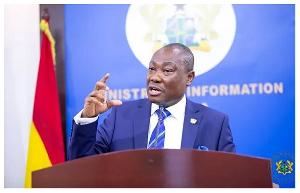The People's National Convention (PNC) and the Great Consolidated People's Party (GCPP) have raised objections to the Electoral Commission's (EC) decision to phase out the use of indelible ink in identifying voters, a measure aimed at preventing multiple voting.
According to representatives of the PNC and GCPP, the issue was never thoroughly discussed during the last Inter-Party Advisory Committee (IPAC) meeting that followed the EC's limited registration exercise.
Farudeen Yakubu, Deputy General Secretary of the PNC, expressed surprise at the EC's decision, stating that it was not brought up for deliberation at the recent IPAC meeting.
Mr Yakubu emphasised that the PNC, represented by its General Secretary and Deputy General Secretary at IPAC, was not part of any discussions on the phasing out of indelible ink.
He asserted that such a critical matter should have been thoroughly deliberated before any decision was made.
Mr Yakubu challenged the EC's decision while speaking on The Citizen's Show hosted by Kwabena Bobie Ansah on Accra 100.5 FM on Thursday, December 14, 2023.
Similarly, Citizen Ato Dadzie, the General Secretary of the GCPP, shared the same sentiment, stating that the issue was not part of the IPAC meeting's agenda.
According to Mr Dadzie, the matter was mentioned casually, and Dr Serebour Quaicoe, the Director of Electoral Services, had to explain the EC's intent, citing a desire to reduce election costs due to the soaring prices of indelible ink worldwide.
Expressing shock at the EC's decision to eliminate the use of indelible ink, Mr Dadzie called on the Peace Council to intervene.
He emphasised that this decision is a crucial aspect of the electoral process and requires careful consideration and discussion among political parties and relevant stakeholders.
Additionally, the two political parties have contested the decision to phase out indelible ink, asserting that the EC did not thoroughly discuss the matter with political parties.
This dissent highlights growing concerns and opposition to the electoral changes proposed by the Electoral Commission.
Politics of Saturday, 16 December 2023
Source: classfmonline.com







![Emmanuel Tetteh George and his wife Ruth Ewoenam [Image Credit: Manuel Photography] Emmanuel Tetteh George and his wife Ruth Ewoenam [Image Credit: Manuel Photography]](https://cdn.ghanaweb.com/imagelib/pics/943/94388192.295.jpg)





